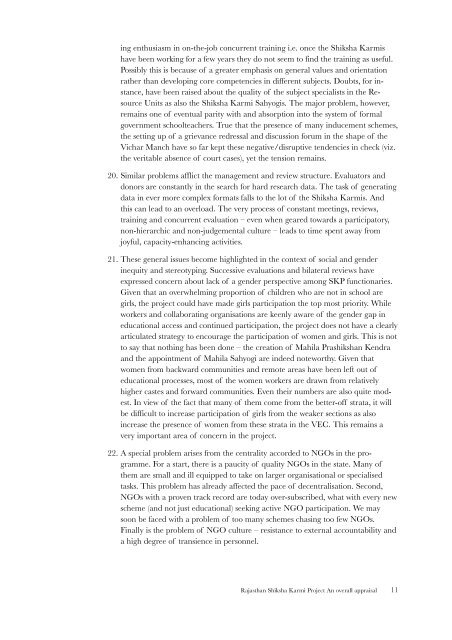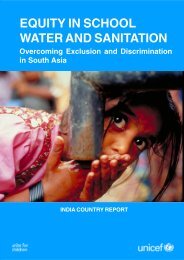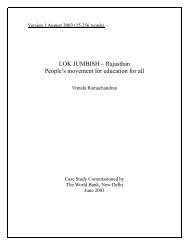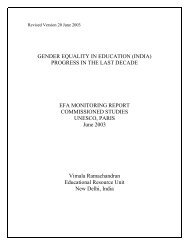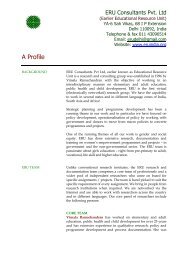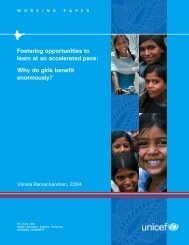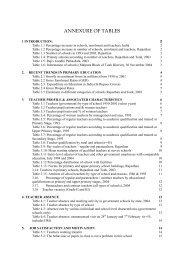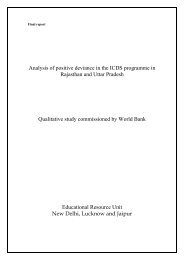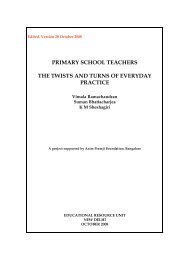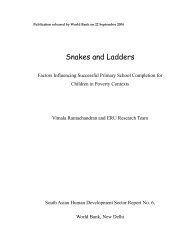Rajasthan Shiksha Karmi Project An overall appraisal
Rajasthan Shiksha Karmi Project An overall appraisal
Rajasthan Shiksha Karmi Project An overall appraisal
Create successful ePaper yourself
Turn your PDF publications into a flip-book with our unique Google optimized e-Paper software.
ing enthusiasm in on-the-job concurrent training i.e. once the <strong>Shiksha</strong> <strong>Karmi</strong>shave been working for a few years they do not seem to find the training as useful.Possibly this is because of a greater emphasis on general values and orientationrather than developing core competencies in different subjects. Doubts, for instance,have been raised about the quality of the subject specialists in the ResourceUnits as also the <strong>Shiksha</strong> <strong>Karmi</strong> Sahyogis. The major problem, however,remains one of eventual parity with and absorption into the system of formalgovernment schoolteachers. True that the presence of many inducement schemes,the setting up of a grievance redressal and discussion forum in the shape of theVichar Manch have so far kept these negative/disruptive tendencies in check (viz.the veritable absence of court cases), yet the tension remains.20. Similar problems afflict the management and review structure. Evaluators anddonors are constantly in the search for hard research data. The task of generatingdata in ever more complex formats falls to the lot of the <strong>Shiksha</strong> <strong>Karmi</strong>s. <strong>An</strong>dthis can lead to an overload. The very process of constant meetings, reviews,training and concurrent evaluation – even when geared towards a participatory,non-hierarchic and non-judgemental culture – leads to time spent away fromjoyful, capacity-enhancing activities.21. These general issues become highlighted in the context of social and genderinequity and stereotyping. Successive evaluations and bilateral reviews haveexpressed concern about lack of a gender perspective among SKP functionaries.Given that an overwhelming proportion of children who are not in school aregirls, the project could have made girls participation the top most priority. Whileworkers and collaborating organisations are keenly aware of the gender gap ineducational access and continued participation, the project does not have a clearlyarticulated strategy to encourage the participation of women and girls. This is notto say that nothing has been done – the creation of Mahila Prashikshan Kendraand the appointment of Mahila Sahyogi are indeed noteworthy. Given thatwomen from backward communities and remote areas have been left out ofeducational processes, most of the women workers are drawn from relativelyhigher castes and forward communities. Even their numbers are also quite modest.In view of the fact that many of them come from the better-off strata, it willbe difficult to increase participation of girls from the weaker sections as alsoincrease the presence of women from these strata in the VEC. This remains avery important area of concern in the project.22. A special problem arises from the centrality accorded to NGOs in the programme.For a start, there is a paucity of quality NGOs in the state. Many ofthem are small and ill equipped to take on larger organisational or specialisedtasks. This problem has already affected the pace of decentralisation. Second,NGOs with a proven track record are today over-subscribed, what with every newscheme (and not just educational) seeking active NGO participation. We maysoon be faced with a problem of too many schemes chasing too few NGOs.Finally is the problem of NGO culture – resistance to external accountability anda high degree of transience in personnel.<strong>Rajasthan</strong> <strong>Shiksha</strong> <strong>Karmi</strong> <strong>Project</strong> <strong>An</strong> <strong>overall</strong> <strong>appraisal</strong>11


